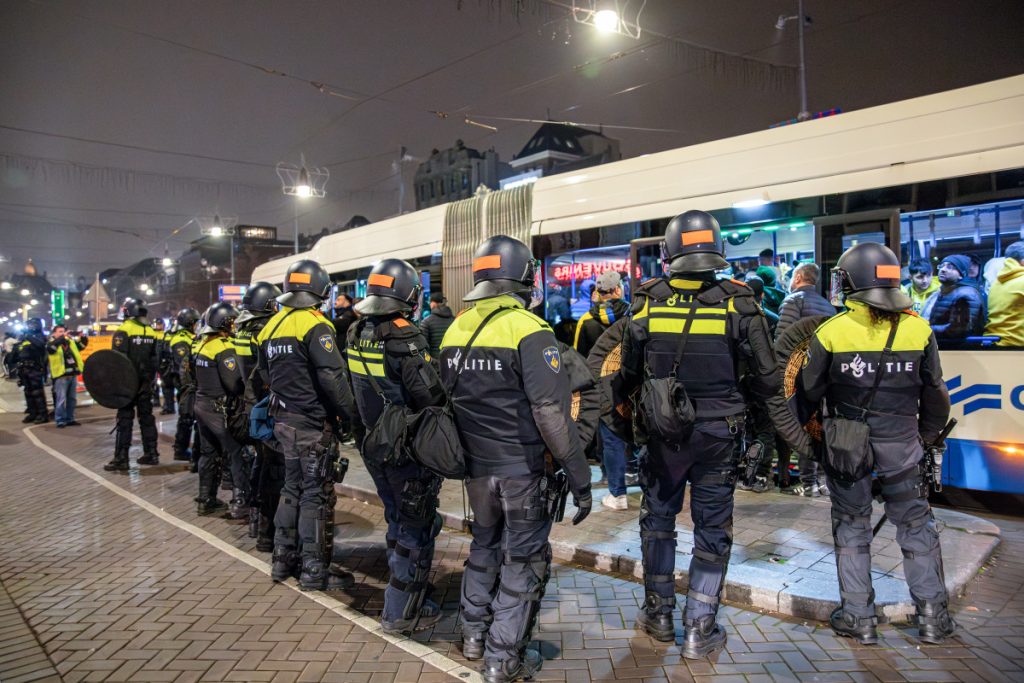Dutch police have arrested five additional men in connection with the violent incidents that followed a football match between Ajax and Maccabi Tel Aviv in Amsterdam on Thursday night. The suspects, all from the Netherlands and aged between 18 and 37, face charges of “public violence against persons” in relation to the disturbances before and after the Europa League match. These arrests bring the total number of individuals detained in connection with the unrest to 68, with authorities continuing to investigate the ongoing violence.
The violence occurred amidst heightened tensions surrounding the match, which saw Maccabi Tel Aviv, an Israeli football team, take on local team Ajax. Following the game, violence erupted in the city, including a series of attacks on Maccabi supporters by youths on scooters, who carried out hit-and-run-style assaults. These youths reportedly targeted fans of the visiting team, leaving five people hospitalized and others with minor injuries.
Prime Minister Dick Schoof condemned the violence, particularly the antisemitic nature of the attacks. He described the incidents as “shocking and reprehensible,” and emphasized that such acts of hatred against Israelis and Jews would not be tolerated. Schoof’s remarks came after multiple reports of aggressive behavior directed at Jewish individuals and the destruction of property, including attacks on people simply attending the football match.
As tensions remained high, further unrest broke out in Amsterdam on Monday evening. Rioters attacked an empty tram, reportedly shouting “Free Palestine” as they caused damage. The tram was struck with fireworks, and its windows were shattered. Fortunately, the fire ignited by the attack was quickly extinguished. Riot police responded promptly to the scene, arresting several individuals and dispersing the crowd. No injuries were reported during this second wave of violence.
The police also reported further disturbances in the city’s western suburbs, where groups of youths, some dressed in black, vandalized cars. Videos of the incident, posted on social media, showed the chaos unfolding, with the tram at the center of the violence. Dutch newspaper de Volkskrant reported that riot officers cleared the area and made additional arrests.
The Dutch authorities have faced significant public scrutiny over the violence, with many condemning the actions of both sides of the conflict. In response to the ongoing unrest, Prime Minister Schoof reiterated his commitment to bring all those responsible for Thursday’s attacks to justice. He stressed the importance of holding perpetrators accountable, adding that the antisemitic attacks witnessed in Amsterdam over the weekend were “unacceptable.”
The prime minister also commented on an incident involving Maccabi supporters, who were reportedly seen attacking a taxi, burning a Palestinian flag, and chanting anti-Arab slogans. While he condemned these actions, Schoof clarified that they were a separate matter from the attacks on Jewish individuals and would be dealt with separately. He emphasized that while violence from any group was inexcusable, it should not be used as a justification for subsequent attacks on Jews or Jewish targets.
The unrest has sparked wider debates in the Netherlands and across Europe. Pro-Palestinian demonstrations, which were planned for the days following the match, were banned by authorities, angering many activists. Some have argued that they should be allowed to express their discontent with Israel’s actions in Gaza, and with the behavior of Maccabi supporters. Police Chief Peter Holla acknowledged that incidents occurred “on both sides” during Thursday’s clashes, highlighting the complexity of the situation.
The violent events in Amsterdam have been widely condemned by political leaders and organizations across Europe, Israel, and the United States. The timing of the violence, on the eve of the Kristallnacht commemorations, has amplified the shock and horror. Kristallnacht, also known as the Night of Broken Glass, was a Nazi-led pogrom against Jewish communities in Germany in 1938. The memory of these horrific events weighs heavily in Europe, especially in countries with significant Jewish populations.
In the Netherlands, where three-quarters of the Jewish population perished during the Holocaust, the rise in antisemitic incidents is particularly concerning. Reports of such attacks have been on the increase across Europe since the outbreak of the Israel-Gaza conflict more than a year ago. This surge in antisemitic incidents has raised alarms among Jewish communities and human rights organizations alike.
Authorities in the Netherlands have vowed to continue their investigation into the violence, with the goal of bringing all those involved to justice. The arrests and actions of the past few days signal that Dutch police are taking the matter seriously, and are committed to maintaining order in the face of mounting tensions. As the situation unfolds, there is growing recognition of the need for greater dialogue and cooperation to prevent further violence and ensure the safety of all individuals, regardless of their ethnicity or religious background.
With the threat of further unrest still looming, both the Dutch government and law enforcement agencies remain focused on restoring peace and addressing the root causes of these violent outbursts.






